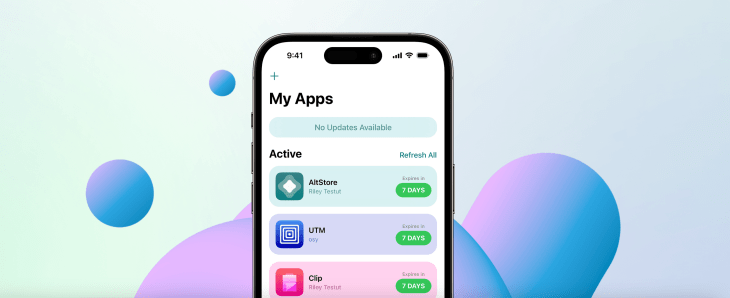Apple’s chokehold on the App Store ecosystem for iPhone apps stifles competition, according to the EU’s Digital Markets Act (DMA), so it’s now forcing the tech giant to open up to new rivals. As a result, we’re beginning to see what an app store ecosystem could look like when other developers are allowed to compete with the default iPhone App Store.
One notable case in point is the AltStore, an alternative app store that’s preparing to take advantage of the DMA to launch an updated version of its app marketplace in the EU, with plans to support Patreon-backed apps.
To comply with the new European law, Apple is introducing APIs and frameworks that allow developers to distribute apps independently of the App Store. The AltStore was quick to capitalize on this possibility, and last week, AltStore developer Riley Testut shared screenshots of the up-and-coming version of his app store that will be offered in the EU.
Instead of relying only on ads, paid downloads or in-app purchases to monetize, the AltStore will allow developers to use its custom Patreon integration to market their apps directly to consumers.
Post by @rileytestutView on Threads
The store — which has offered sideloading apps like the video game emulator Delta, also from Testut — will initially launch in the EU with just two apps, the developer says. Delta will be available for free and the AltStore’s own clipboard manager Clip will require a pledge of $1 or more on the crowdfunding platform Patreon. The AltStore plans to add the beta versions of both Delta and Clip soon after, which will require a $3 per month Patreon pledge to use.
This unique business model for monetizing apps is similar in some ways to Apple’s in-app subscriptions but comes without the traditional 15% to 30% commission on sales that the tech giant currently takes. With Apple’s DMA rules, alternative app stores can opt to pay €0.50 for each first annual install per year over a 1 million threshold — a new scheme to tap into the revenue of larger apps, which Apple calls its Core Technology Fee. (Whether Apple’s fee will remain is uncertain, as the EU is investigating the tech giant for non-compliance with its competition law.)
As Testut explains, after the AltStore launches and is working properly, the plan is to then allow other developers to also distribute their apps through the storefront by establishing their own sources.
“They’ll also be able to use the same Patreon integration we use to distribute ‘paid’ apps,” Testut told TechCrunch. This integration will create a new business model for apps that wouldn’t be permitted without the DMA coming into effect.
“One thing @altstore does that should really get you thinking about alternative payment systems that Apple never would have considered: it has Patreon integration, and can tie access to apps to your Patreon pledge — which gives you an entirely different, personal relationship with your users, and lets you use the same reward system you use for videos, blog posts, merch, etc,” wrote iOS developer Steve Troughton-Smith in a post on Mastodon. “Alternative app stores don’t just have to recreate Apple’s model,” he added.
Plus, he pointed out how the AltStore will provide users with a “granular view” of the entitlements — or extra permissions — that an app has, before you install it.
Beyond offering developers a new way to make money, Testus claims that the EU version of the AltStore will be “dramatically simpler” to use compared with the current version.
Today, users who want to sideload apps via the AltStore without jailbreaking their iPhone have to use a Mac or PC, provide the AltStore with their Apple ID and password, and then refresh the apps every seven days. That process not only raises security concerns, but is also complex. However, the EU version of AltStore won’t require these steps.
“It all works virtually the same as the App Store now,” Testut says.
In the screenshots he shared, the AltStore looks much like a modern-day app store, with categories like Games, Lifestyle and Utilities, as well as buttons to download its free apps, as on Apple’s App Store. However, the user interface will be slightly different, as Apple requires developers to insert an additional confirmation screen after the user clicks to install an app. This screen warns consumers that updates and purchases will be managed by the AltStore, as opposed to Apple.
Testut also notes that the AltStore apps have to be notarized by Apple in order to be installed, so it won’t be able to install just any sideloaded app available as an .ipa file.
The new AltStore is ready to launch now, but Testut says he’s waiting on final approval from Apple.
